May 19, 2025 | 10:34 GMT +7
May 19, 2025 | 10:34 GMT +7
Hotline: 0913.378.918
May 19, 2025 | 10:34 GMT +7
Hotline: 0913.378.918

Deputy Minister of Agriculture and Rural Development Tran Thanh Nam (middle) visits the booths of Vietnamese enterprises at the Thaifex Anuga Asia 2022.
Vietnamese agro-products being deep-processed, having high prices and beautiful packages, favored by domestic consumers and hunted by major markets around the world is a beautiful dream but it’s actually not too far-fetch. Talking with individuals who make precious products in the East, we return to the question: How can they acquire new knowledge, skills, and techniques, and are full of creativity and success in this global integration period?
We sent the question to the leaders of the Thailand Ministry of Agriculture and Cooperatives while preparing for the visit taking place on May 27 within the framework of the Thaifex Anuga 2022 Food and Beverage Fair. And to our surprise, the question was thoroughly researched by the Thai leader and soon replied with an open answer.
Chief Advisor of Thailand Ministry of Agriculture and Cooperatives Ratchasub Nishida acknowledged the difficulties encountered when working with farmers. “Doing the same thing like the previous generations won't change farmers. They would still produce as they have done, making it difficult to meet the new requirements, standards, and technical barriers from Europe, Asia, and America."
Advisor Ratchasub said that product innovation was not only about product innovation but also about the people who made the product. There are currently many new technologies such as AI and IoT, but those are just tools for support.
"Our experience over time is that if we bring out money and favorable policies to help them change, the change is not sustainable. The main point of making sustainable change is that farmers must deeply feel the need to change mindset.
“The concept of sustainable development is too big and vague for the people. Meanwhile their needs are simple: keep quality consistent and adhere to strict standards every day. The same amount of work every day, if guaranteed, means that the people have developed sustainably," said Advisor Ratchasub.

The Vietnamese business delegation came to work with leaders of the Thailand Ministry of Agriculture and Cooperatives.
Thai farmers are paying keen attention to marketing. But in the wave of the new trend, marketing activities also require changes.
To make it easy for people to understand, the Thailand Ministry of Agriculture and Cooperatives briefly interprets "marketing" into three components: Meet, Credential and Trend. That is, if farmers want to do good marketing, they need to master consumer trends, comply with standards and always interact with customers to gain a deep understanding of the market.
The secret lies in the need to build a close-knit companion ecosystem to help farmers. While waiting for farmers to realize the present fact, the Thailand Ministry of Agriculture and Cooperatives has organized a force of agricultural extension officers, promotion officers, technicians, and associations so that each group can support farmers along the entire length of the value chain from input to output.
The story of the methods to support Thai farmers is regularly discussed between the market experts of the Vietnam Business Association of High Quality Products and colleagues in Ho Chi Minh City.
Farmers are the most self-aware and free individuals. They have long gotten used to the inertia of thoughts: Every product can be sold regardless of quality, and even if it is too difficult to sell, they can just lower the price. When they are detected using chemicals fertilizers and pesticides that are not on the list or in excess, farmers' awareness is shown to remain limited. There have been many solutions tested before, but there is no real sustainable solution to this problem.
Collective punishment when an individual violates is a way that has been applied by some sustainable coffee production programs but cannot be replicated. Building an interactive team to regularly share information and correct deviations in the farming process or close support at each stage is also a way, but it takes a lot of resources and effort to get certain results.
To help farmers change, in the end we still return to the foundation solution: make farmers in the short term understand the necessary condition - daily efforts are the root cause of success; then open up the sufficient conditions - building a practical ecosystem of companionship for farmers.
Translated by Samuel Pham

(VAN) 14 out of 35 domesticated elephants in Dak Lak province have had their living conditions improved, with 11 of them currently participating in the non-riding elephant tourism model.

(VAN) Muong Nhe Nature Reserve hopes that being upgraded to a national park will lay the foundation for forest protection efforts to be carried out in a systematic, modern, and sustainable manner.
/2025/05/16/3923-2-171845_52.jpg)
(VAN) Lower costs, higher yields, and improved soil quality are outstanding benefits that soybeans bring when integrated into the crop rotation system.

(VAN) The 'For a Green National Environment' programme aims to promote a green lifestyle, support businesses in implementing ESG practices, and turn Net Zero commitments into concrete actions.

(VAN) Cold-barn systems efficiently manage environmental and temperature conditions, which aids in the prevention of respiratory diseases in pigs and protects them from the vectors that transmit African swine fevers.

(VAN) To tackle challenges, the project 'Addressing key technical bottlenecks in the grouper supply chain in Vietnam' has been underway since 2024.

(VAN) The project 'Disease-Resilient and Sustainable Cassava Production Systems in the Mekong Region', funded by the Australian Center for International Agricultural Research (ACIAR), is being implemented from 2024 to 2028.